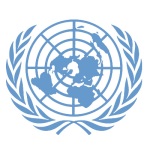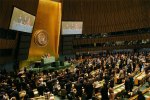The United Nations is often criticized as a structure that has failed to live up to its promise. Some say it is a waste of money. I, myself, in a previous article on this blog, drew out some shortfalls, which I experienced first hand during my internship there in June of this year. Having just read Stephen Schlesinger’s book, “Act of Creation: The Founding of the United Nations,” I would have to say that it has much to do with the politics behind its founding. Yet, for all that, I do believe it has and does achieve much good and the world is better off for it than without it. To that end, I found the summary in the above mentioned book’s epilogue, an excellent resume of its achievements, and quote the last two paragraphs below:
Founding of the United Nations,” I would have to say that it has much to do with the politics behind its founding. Yet, for all that, I do believe it has and does achieve much good and the world is better off for it than without it. To that end, I found the summary in the above mentioned book’s epilogue, an excellent resume of its achievements, and quote the last two paragraphs below:
“In the 60 years of the U.N.’s life, there has been a remarkable change in the nature of the state structure. Whether this has to do directly with the United Nations or not is unclear, but undoubtedly the presence of the U.N. reinforced such trends. First, there was the extraordinary decolonisation of the world, not foreseen. Second, there has been an unprecedented spread of democracy and mixed economies around the globe. Freedom House found that, in 1950, there were 22 democracies accounting for 31% of the world’s population and a further 21 states with restricted democratic practices accounting for 11.9% of the world’s citizenry. In 2000, electoral democracies represented 120 of the 192 existing nations and constituted 62.5% of the earth’s population. Third, apart from 4 incidents – Turkey’s seizure of two-fifths of Cyprus; Morocco’s incursion into Western Sahara; the invasion of Kuwait by Iraq; and Indonesia’s takeover of East Timor (the latter 2 which have been reversed by the UN) – there have been almost no attempts at annexation by one state of another during the UN’s existence. Fourth, there have been no nuclear conflicts during the UN reign, though innumerable small wars. Fifth, the UN has helped to alter permanently the concept of global relations by providing a forum for states to talk to each other on a continuous basis, and has helped to assist the spread of international law through ratification of norms of behaviours by all nations.
It is ironic that the United States, which created the UN, has remains wary about the assembly, if not hostile toward it. In 1945, Fareed Zakaria reminds us, “when America was even more powerful than it is today – by some measures it had 50% of the world output – it put into place a series of measures designed to rebuild its adversaries, institutionalise international cooperation on dozens of global issues, and alleviate poverty. No other nation would have done this.” And, as President Dwight Eisenhower once said: “With all the defects, with all the failures that we can check up against it, the  UN still represents man’s best-organized hope to substitute the conference table for the battlefield.” Six decades later, the United States, which showed such prescience and foresight, continues to support the UN only fitfully. It must now find its way back to one of its greatest creations.” (pp. 286-287)
UN still represents man’s best-organized hope to substitute the conference table for the battlefield.” Six decades later, the United States, which showed such prescience and foresight, continues to support the UN only fitfully. It must now find its way back to one of its greatest creations.” (pp. 286-287)
It is tragic, instead, to find the Tea-Party movement pushing for the United States to leave the U.N. It is clear, from having read Schlesinger’s book, that isolationism runs very deep in the American culture.
